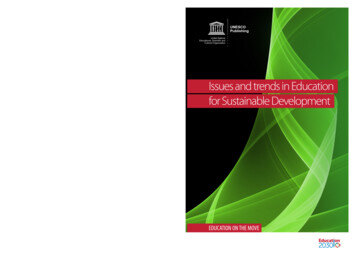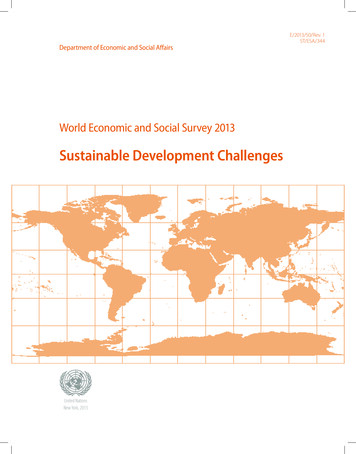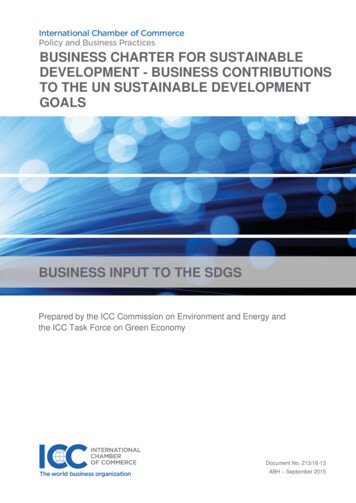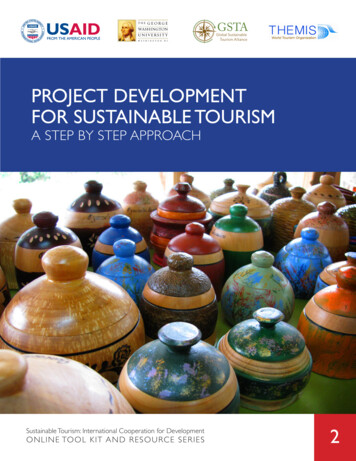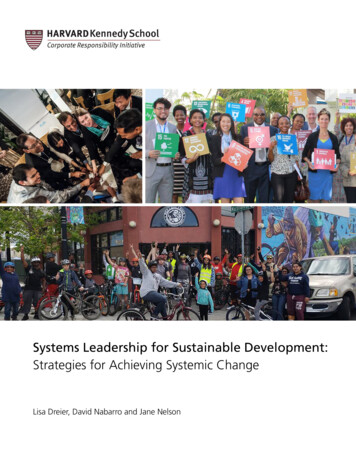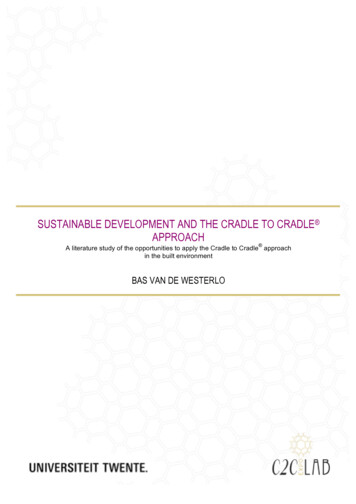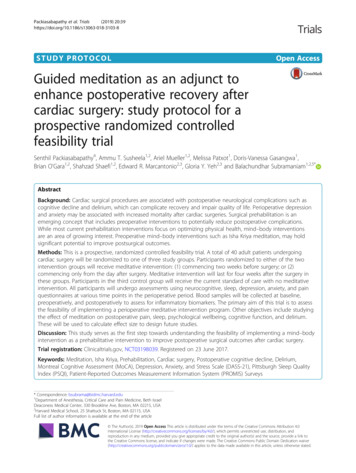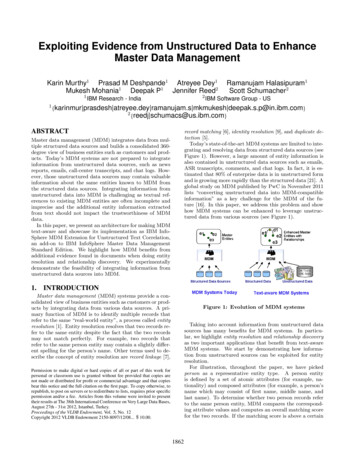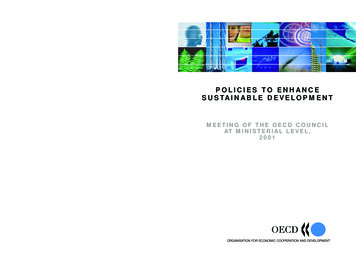
Transcription
POLICIES TO ENHANCES U S TA I N A B L E D E V E L O P M E N TMEETING OF THE OECD COUNCILAT M I N I S T E R I A L L E V E L ,2001www.oecd.orgORGANISATION FOR ECONOMIC COOPERATION AND DEVELOPMENT
Policies to EnhanceSustainableDevelopmentORGANISATION FOR ECONOMIC CO-OPERATION AND DEVELOPMENT
ORGANISATION FOR ECONOMIC CO-OPERATIONAND DEVELOPMENTPursuant to Article 1 of the Convention signed in Paris on 14th December 1960, andwhich came into force on 30th September 1961, the Organisation for Economic Co-operationand Development (OECD) shall promote policies designed:– to achieve the highest sustainable economic growth and employment and a risingstandard of living in Member countries, while maintaining financial stability, andthus to contribute to the development of the world economy;– to contribute to sound economic expansion in Member as well as non-membercountries in the process of economic development; and– to contribute to the expansion of world trade on a multilateral, non-discriminatorybasis in accordance with international obligations.The original Member countries of the OECD are Austria, Belgium, Canada, Denmark,France, Germany, Greece, Iceland, Ireland, Italy, Luxembourg, the Netherlands, Norway,Portugal, Spain, Sweden, Switzerland, Turkey, the United Kingdom and the UnitedStates. The following countries became Members subsequently through accession atthe dates indicated hereafter: Japan (28th April 1964), Finland (28th January 1969),Australia (7th June 1971), New Zealand (29th May 1973), Mexico (18th May 1994),the Czech Republic (21st December 1995), Hungary (7th May 1996), Poland(22nd November 1996), Korea (12th December 1996) and the Slovak Republic(14th December 2000). The Commission of the European Communities takes part inthe work of the OECD (Article 13 of the OECD Convention).Publié en français sous le titre :POLITIQUES A L’APPUI DU DÉVELOPPEMENT DURABLE OECD 2001Permission to reproduce a portion of this work for non-commercial purposes or classroomuse should be obtained through the Centre français d’exploitation du droit de copie (CFC),20, rue des Grands-Augustins, 75006 Paris, France, tel. (33-1) 44 07 47 70, fax (33-1) 46 34 67 19,for every country except the United States. In the United States permission should beobtained through the Copyright Clearance Center, Customer Service, (508)750-8400,222 Rosewood Drive, Danvers, MA 01923 USA, or CCC Online: www.copyright.com. All otherapplications for permission to reproduce or translate all or part of this book should be madeto OECD Publications, 2, rue André-Pascal, 75775 Paris Cedex 16, France.
PrefaceIn May 1998, OECD Ministers agreed “ that the achievement of sustainabledevelopment is a key priority for OECD countries. They encouraged the elaboration of a strategy in the areas of climate change, technological development,sustainability indicators, and the environmental impact of subsidies”. They alsoagreed “ to interpret the term ‘sustainable’ as including social and environmental, as well as economic, considerations”, and in a context of “ integratingeconomic, environmental and social policies to enhance welfare”. Finally, they“ stressed the importance of promoting effective integration of environmentalconsiderations in the multilateral [trade and investment] system”. A report,including policy recommendations, was anticipated in 2001.The report Policies to enhance sustainable development responds to that mandate. Itdraws mainly on recent work done by the OECD and its affiliate Organisations1 onvarious themes related to sustainable development. It also uses other appropriate sources to complete the discussion of these themes. Consistent with the mandate for the project, the report makes no attempt to be comprehensive in itstreatment of sustainable development. Rather, it focuses on policy options available to OECD countries to improve the integration of environmental considerations into the working of the economic system, and to address some of the socialconsequences of better integration. While many of these policy options are wellknown, their actual implementation in Member countries has often fallen short ofwhat is desired. This report stresses that high priority needs to be put on buildingstronger support within governments, and society more broadly, for comprehensive implementation of sustainable development policies, both domestically andinternationally.A range of government agencies, international organisations and groups incivil society are actively promoting the sustainable development agenda. Whatthe OECD brings to these efforts is its economic perspective to these issues and itsmultidisciplinary expertise. Implementing policies in practice that promote sustainable development requires the strong involvement of both economic andother policy communities, as well as ongoing efforts to build bridges amongthese communities. OECD 20013
Policies to Enhance Sustainable DevelopmentPolicies specifically aimed at securing sustained economic growth, a healthyenvironment or an inclusive social development are important in their own rightfor sustainable development. Although these policies are not extensively discussed in this report, related OECD documents on economic growth (OECD,2001b), on an environmental strategy for the next decade (OECD, 2001d), and onguidelines for poverty reduction in developing countries (OECD, 2001a) contributeto the analysis of policies in these other areas. These reports are also highly relevant for the broader discussion on sustainable development.The policy report, Policies to Enhance Sustainable Development, builds upon, and iscomplemented by, a more detailed analytical report on sustainable development(OECD, 2001e). It is provided as background for the OECD Council MinisterialMeeting in May 2001, and is published under the responsibility of the SecretaryGeneral. Other related publications generated during the course of the OECDProject on Sustainable Development are listed below.Other OECD publications released in the context of the three-year projecton sustainable developmentOECD (2001), Sustainable Development: Critical Issues, Paris, forthcoming.OECD (2001), OECD Environmental Outlook, Paris.OECD (2001), The Well-being of Nations: The Role of Human and Social Capital, Paris.OECD (2001), International Science and Technology Co-operation. Towards Sustainable Development, Paris.OECD (2000), “Special Issue on Sustainable Development”, Science, Technology andIndustry Review, No. 25, Paris.OECD (2000), Frameworks to Measure Sustainable Development: An OECD Expert Workshop,Paris.OECD (2000), Towards Sustainable Development: Indicators to Measure Progress: Proceedingsof the Rome Conference, Paris.OECD (2000), Governance for Sustainable Development: Case Studies of Canada, Germany,Japan, Netherlands and United Kingdom, Paris.OECD (2000), Transition to Responsible Fisheries: Economic and Policy Implications, Paris.OECD (1999), Action Against Climate Change: The Kyoto Protocol and Beyond, Paris.OECD (1999), National Climate Policies and the Kyoto Protocol, Paris.OECD (1999), Technology and Environment: Towards Policy Integration, Paris.OECD (1999), Framework to Measure Sustainable Development, Paris.IEA (1999),World Energy Outlook: Looking at Energy Subsidies: Getting the Prices Right,Paris.NEA (2000), Nuclear Energy in a Sustainable Development Perspective, Paris.4 OECD 2001
Key Challenges and Policy ResponsesIntroductionOECD countries routinely refer to economic growth as a measure of increasinghuman welfare. That economic growth is used as a proxy for welfare is not surprising.After all, consumption possibilities are a major component of welfare as the publicunderstands it. But that same public is also aware that economic growth alone cannot fully describe its needs and wants. It is reminded of this by some of the negative consequences of economic activity – health risks from transport emissionsand ozone depletion, declining bio-diversity from loss of habitat, and new formsof inequality associated with changes in technologies and production patterns.This is the context in which the concept of sustainable development has taken root –i.e. that of linking the economic, social and environmental objectives of societiesin a balanced way. The Brundtland Commission defined sustainable developmentas development that “meets the needs of the present without compromising theability of future generations to meet their own needs” (WCED, 1987).Concern for the interests of future generations will, for many people, be reason enough to look beyond economic growth as an indicator of welfare. But thereare other reasons as well. The long term sustainability of economic growth itselfdepends on maintaining basic ecosystem services, a healthy environment andcohesive societies. Balancing these elements will require stronger co-operationwith developing and transition countries – which already represent over 80% ofthe world population, and which will account for virtually all of its future increase –because risks of disintegration and exclusion affect all countries, as do opportunities to benefit from participation in a growing global economy. Hence the importance of taking a broader view of what welfare entails, a longer-term view aboutthe consequences of today’s activities, and of greater emphasis on internationalco-operation to reach viable solutions. Ten years after the Rio Conference on theEnvironment and Development, 2 the concept of sustainable development isfirmly rooted in standard economic analysis (Box 1). But for all the work at the conceptual level, its implementation in practice remains muted and uneven. Given theurgency with which the case for sustainability is often made, why have concreteactions lagged behind? OECD 20015
Policies to Enhance Sustainable DevelopmentBox 1.Key conceptsSustainable development can be interpreted in economic terms as “development that lasts” (Pearce and Barbier, 2000) – i.e. a path along which the maximisationof human well-being for today’s generations does not lead to declines in future well-being. Thisreport interprets human well-being as including not only the satisfaction ofeconomic needs, but also aspirations for a clean and healthy environment, andpreferences in terms of social development. Types of capital that sustain wellbeing – because of their levels and distribution – include man-made, natural,human and social capital. Their “adequacy” to support well-being depends on theinteraction among them, as well as on the size of the population, its characteristicsand preferences. Different types of capital provide one of the main mechanismsthrough which generations are connected to each other – as their stocks are influenced by current investment decisions, but their lives span several generations.A key issue for sustainable development is the extent to which different typesof capital can be substituted for each other. When substitution at the margin ispossible, depletion of one type of capital is consistent with sustainability if it canbe offset by an increase in other types. However, substitution between differenttypes of capital is not always possible. For example, in the presence of criticalthresholds for some resources, the cost of further degradation may escalate rapidly, calling for policies that maintain the quality and resilience of these resources.In the case of resources where critical thresholds can be defined, more stringentcriteria for sustainability will apply (Box 2).6The policy report identifies some of the key challenges and barriers – conceptual and practical – that stand in the way of progress, and some of the areas whereconcrete government actions in Member countries would allow better integration ofenvironmental, economic and social goals. The agenda that sustainable developmentespouses is both complex and broad. Hence the importance of focusing on only someof the key areas – those where the risks of non-sustainability are highest. This reportconcentrates on risks of irreversible depletion and degradation of a range of naturaland environmental resources, and suggests a comprehensive set of measures torespond to those risks. Although opportunities to contribute to long term sustainability via economic and social policies are clearly important, comprehensive sets of policies in these two domains are – at least in OECD countries – relatively wellestablished.3 So are the linkages between economic4 and social policies.5 In contrast,environmental policies, and their linkages with both economic and social policies, aregenerally less well understood. These linkages need to be strengthened to supportsustainable development. Because of these considerations, much of the focus of thepolicy report is on the environment-economy link, partly because the stakes in this OECD 2001
Policies to Enhance Sustainable Developmentarea are especially high, and partly because less is known about the environmentalsocial connection. Improving the coherence between economic and environmentalpolicies would contribute to removing those inappropriate incentives that are leadingtowards unsustainable resource depletion and environmental degradation.The measures described in this report cover four broad areas for action: The use of the price system to encourage individual agents to take the fullcosts of environmental degradation into account in their decisions. The reform of governments’ decision-making processes to allow more integrative approaches to the full range of consequences of their policies. The use of technology policies to help de-couple environmental degradationfrom economic growth. The strengthening of the contribution of the international trade and investment systems to sustainable development world-wide.Recommendations in each of these areas are presented at the end of this textand are supported by more detailed analysis in the full policy report. These crosscutting recomm
While many of these policy options are well-known, their actual implementation in Member countries has often fallen short of what is desired. This report stresses that high priority needs to be put on building stronger support within governments, and society more broadly, for comprehen-sive implementation of sustainable development policies, both domestically and internationally. A range of .
